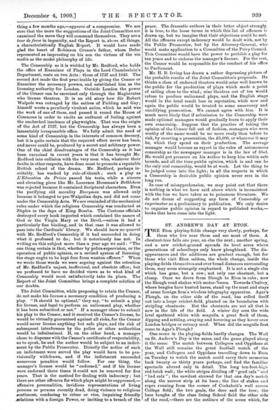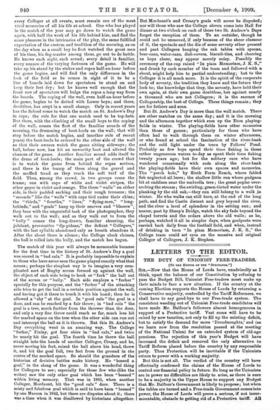ST. ANDREW'S DAY AT ETON.
THE Eton playing-fields change very slowly, perhaps, for those who live near them and see most of them. A. chestnut-tree falls one year, an elm the next ; another spring, and a new cricket-ground spreads its level acres where generations of schoolboys only knew ploughland. The dis- appearances and the additions are gradual enough, but for those who visit Eton seldom, the whole change, inside the playing-fields themselves and over broad distances surrounding them, may seem strangely emphasised. It is not a single elm which has gone, but a row ; not only one chestnut, but a clump. Once we drove from Slough to Eton in cabs ; now the Slough road shakes with motor-'buses. Towards Chalvey,. where beagles have hunted hares, stand up the mast and stays of some foreign firms wireless telegraphy apparatus. Agar'a Plough, on the other side of the road, has rolled itself. out into a large cricket-field, planted on its boundaries with stripling chestnuts. But the chestnuts are not all that is new in the life of the field. A winter day sees the wide level spattered white with seagulls, a great flock of them, dipping and settling, swaying and hovering as they hover over London bridges or estuary mud. When did the seagulls first come to Agar's Plough ?
One scene in the playing-fields hardly changes. The Wall on St. Andrew's Day is the same, and the game played along it the same. The match between Collegers and Oppidans at the Wall still remains the great football match of the year, and Collegers and Oppidans travelling down to Eton on Tuesday to watch the match could carry their memories back twenty or thirty years perhaps, and find the familiar spectacle altered only in detail. The long ten-foot-high red-brick wall ; the white stripes dividing off "good calx " and "bad calx " ; the sawdust strewed for that one day's match along the narrow strip at its base ; the line of stakes and ropes running from the corner of Cockshott's wall across College field ; the two goals, the door and the tree; the- bare toughs, of the elms lining School field the other side . of the road,—there are the outlines of the scene which, for every Colleger at all events, must remain one of the most vivid memories of all his life at school. One who has played in the match of the year may go down to watch the game again, with half the work of his life behind him, and find the same pleasure in the intricacies of the play, the same fulfilled expectation of the custom and tradition of the morning, as on the day when as a small boy he first watched the great men of his time, his fag-master among them, go out to do battle. He knows each sight, each sound; every detail is familiar, every nuance of the varying fortunes of the game. He will take up his stand by the stakes and ropes half-an-hour before the game begins, and will find the only difference in the look of the field as he comes in sight of it to be a line of boards laid down for spectators to stand on and keep their feet dry; but he knows well enough that the front row of spectators will bulge the ropes a long way from the boards. The coping of the wall, even half-an-hour before the game, begins to be dotted with Lower boys; and there, doubtless, has crept in a small change. Only in recent years has the School come to watch the match on St. Andrew's Day in caps; the rule for that one match used to be top-hats. But there, with the climbing of the small boys to the coping of the wall, comes the first of the familiar sounds of the morning, the drumming of boot-heels on the wall; that will stop before the match begins, and (another rule of recent years) the boot-heels be ordered to the other side of the wall so that their owners watch the game sitting sideways ; the ball, before now, has hit an unworthy boot and altered the chances of the game. Another familiar sound adds itself to the drum of boot-heels; the main part of the crowd that is to watch the game from behind the ropes arrives, and there is the tramp of them along the gravel and the muffled tread as they reach the soft turf of the field. Then, among the crowd, in two groups come the teams; one with caps of white and violet stripes, the other gayer in violet and orange. The three " walls" on either side, in their padded sacking and their rough trousers ; the " seconds " like the " walls " with caps tied under their chins; the "thirds," "fourths," "lines," "flying-men," "long- behinds," and "goals" hang up their scarves and " blazers "; they bear with the ungrateful task of the photographer, they walk out to the wall; and as they walk out to form the " bully " comes the long-drawn, familiar shouting, the jubilant, provocative " Op-pidans," the defiant " Collegers," with the last syllable abandoned only as breath abandons it. After the shout there is silence ; the College clock chimes, the ball is rolled into the bully, and the match has begun.
The match of this year will always be memorable because for the first time in the history of St. Andrew's Day a goal was scored in " bad cals." It is probably impossible to explain to those who have never seen the game played exactly what that means ; perhaps the simplest way is to imagine a very com- plicated sort of Rugby scrum formed up against the wall, the object of each side being to hook or " furk" the ball out of the serum or "bully." Each aide employs a "furker" specially for this purpose, and the " furker " of the attacking side tries to get the ball in a certain position against the wall, and having got it there to touch it with his hand; then he is allowed a " shy " at the goal. In " good calx " the goal is a door, and can be reached by a fair throw; in "bad cols" the goal is a tree, much further from the thrower than the door, and only a very fine throw could reach so far, much less hit the marked space on the tree when the other side can run out and intercept the ball as it is thrown. But this St. Andrew's Day everything went in an amazing way. The College "furker," Finlay, got four shies in "bad eels," and twice he nearly hit the goal. The fourth time he threw the ball straight into the hands of another Colleger, Creasy, and he, never moving his feet, raised the ball above his head, threw it, and hit the goal full, two feet from the ground in the centre of the marked space. So should the grandson of the historian of decisive battles make history. He "bossed a goal," in the slang of the game. It was a wonderful thing for Collegers to see ; especially for those few who (like the writer) saw the only other goal which has been " bossed " within living memory. That was- in 1885, when another Colleger, Mordannt, hit the "good rain" door. There is a misty and fabulous goal which is said to have been "bossed" by one Marron in 1842, but there are disputes about it; there was a time when it was disallowed by historians altogether.
But Mordaunt's and Creasy's goals will never be disputed; nor will those who saw the College eleven come into Hall for dinner at two o'clock on each of those two St. Andrew's Days forget the reception of them. To an outsider, though he could not be unmoved, if only because of the sheer clamour of it, the spectacle and the din of some seventy other present and past Collegers banging the oak tables with spoons, beer-cans, water-cans, dish-covers, biscuit-tins, and cheering as boys cheer, may appear merely noisy. Possibly the ceremony of the cup raised "In plain Memoriam, J. K. S.," and drunk by each member of the team and followed with a shoat, might help him to partial understanding; but to the Colleger it is all much more. It is the spirit of the corporate body of seventy, the tradition they know and the future they look to; the knowledge that they, the seventy, have held their own again, at their own game doubtless, but against nearly a thousand who are not Collegers ; it is the essence of Collegership, the best of College. These things remain ; they are for fathers and sons.
But St. Andrew's Day is more than the wall match. There are other matches on the same day; and it is the morning and the afternoon together which sum up the Eton playing- fields in winter. The playing-fields have other memories than those of games ; particularly for those who have often had to walk through them on winter afternoons, or who found at school the fascination of the river-bank and the cold light under the trees by Fellows' Pond. Probably as few boys spend their time fishing in those rather ungenerous waters to-day as spent their time- fishing twenty years ago; but for the solitary race who have wandered occasionally with rods along the river-bank the playing-fields have their own spaces and memories. The " perch hole," by Sixth Form Bench, where fabled fish neglected all lures; the shallow little run where gudgeon bit at caddises near the umbrella tree ; the great poplar over- arching the stream ; the swirling, green-tinted water under the planking by the old oak,—they can still belong to a walk in winter. He who walks can still turn, at the end of the long path, and find the Castle distant and grey beyond the river, and the river a level of splendour in the setting sun ; and nearer, past by Sheep's Bridge, watch the sky fade beyond the chapel turrets and the cedars above the old walls; as he, perhaps, watched it all in simpler clays, when goalposts were carried back daily from the football field, and when, instead of drinking in turn " In piam Memoriam, J. K. S.," the College team could set eyes on the massive and original Colleger of Collegers, J. S. Stephen.







































































 Previous page
Previous page